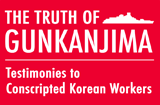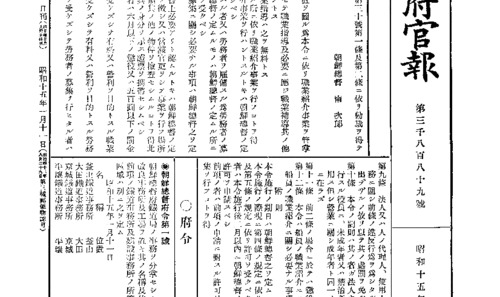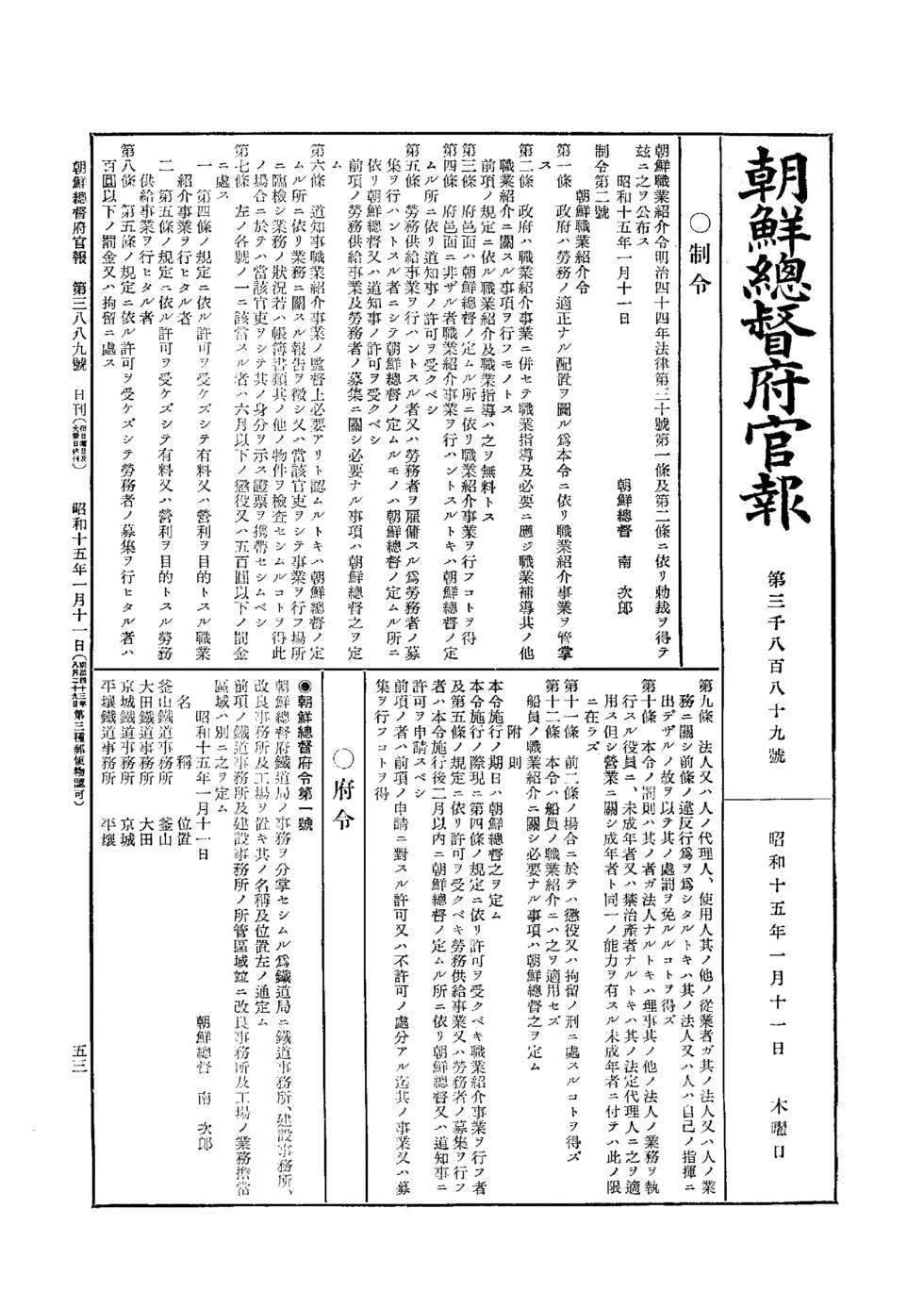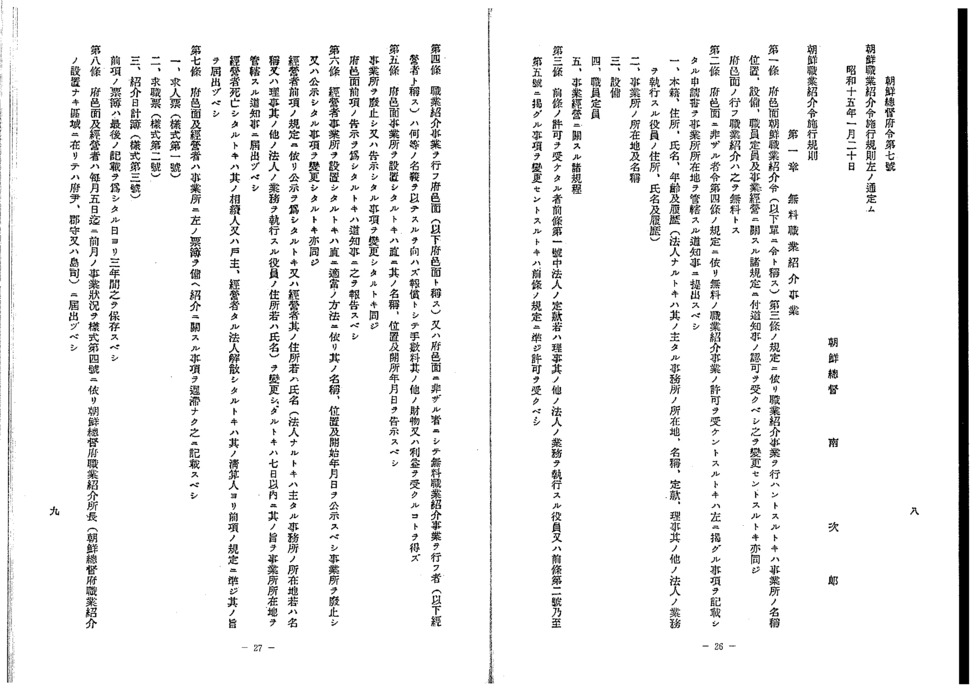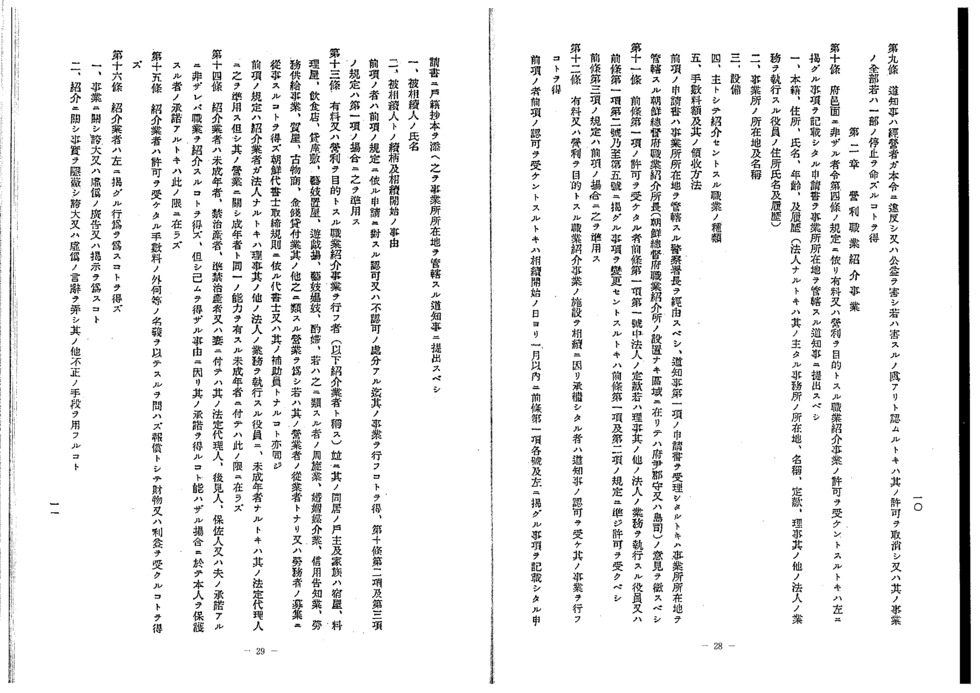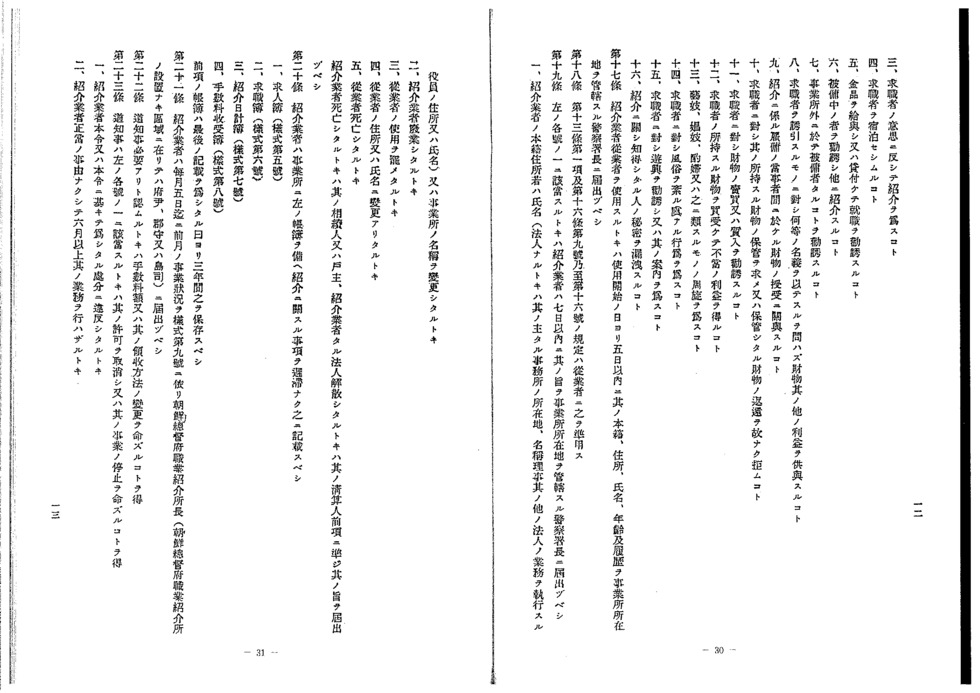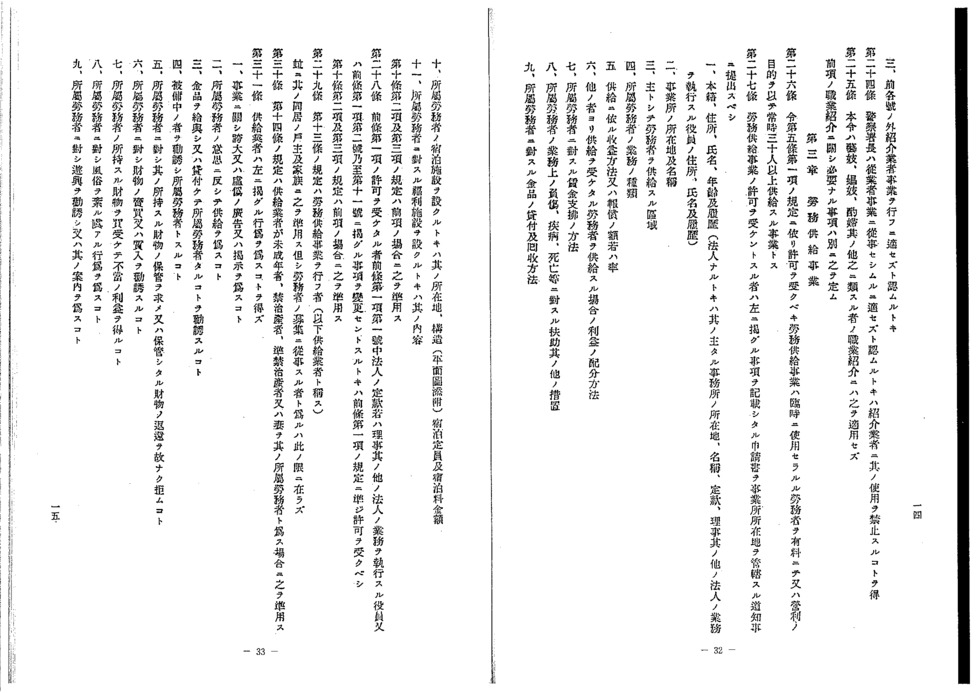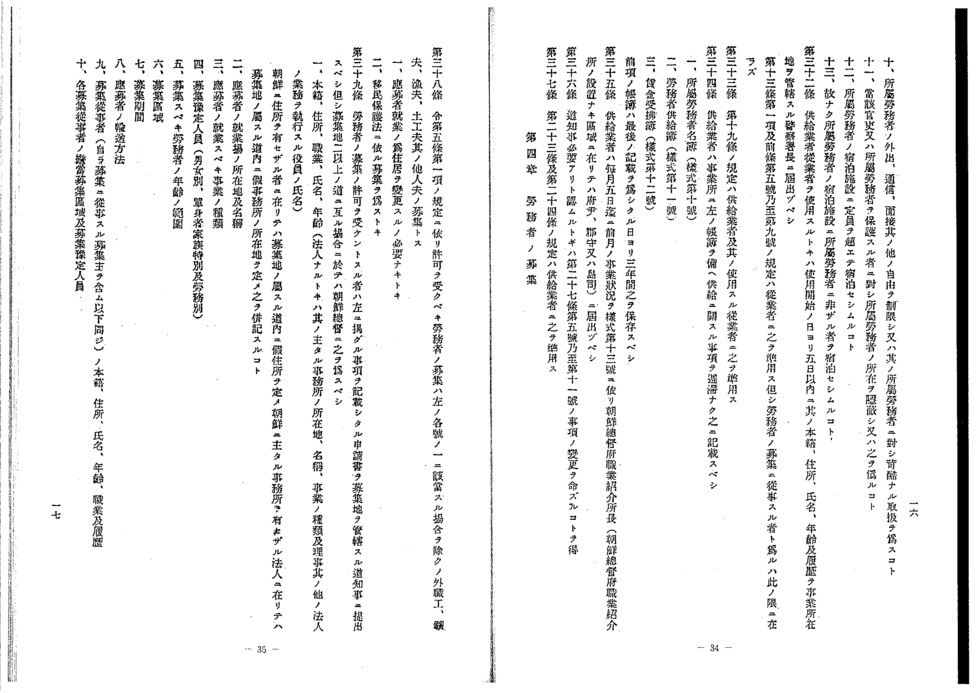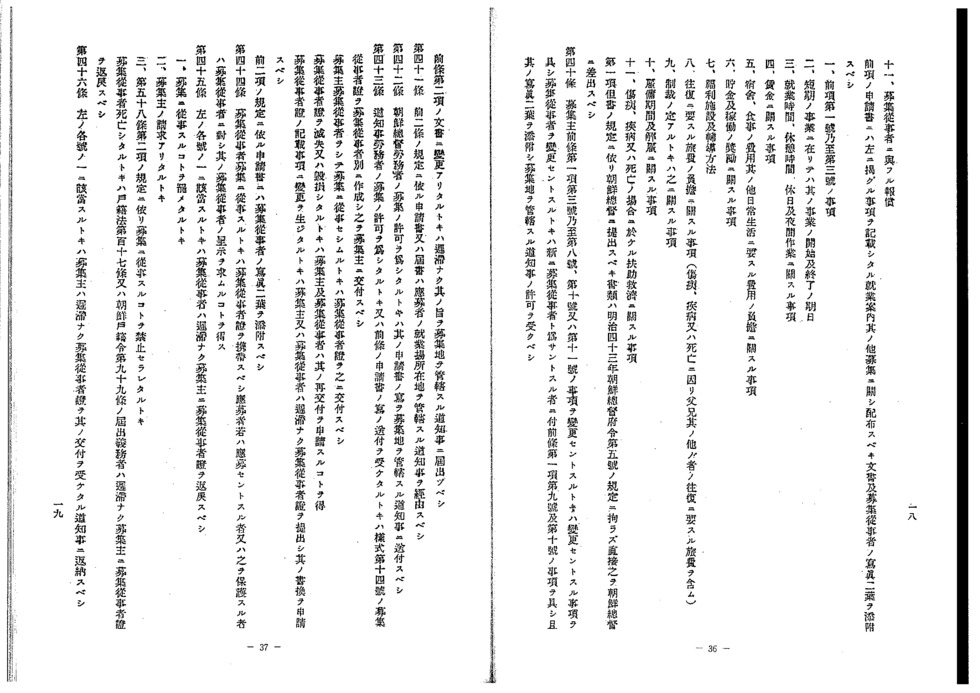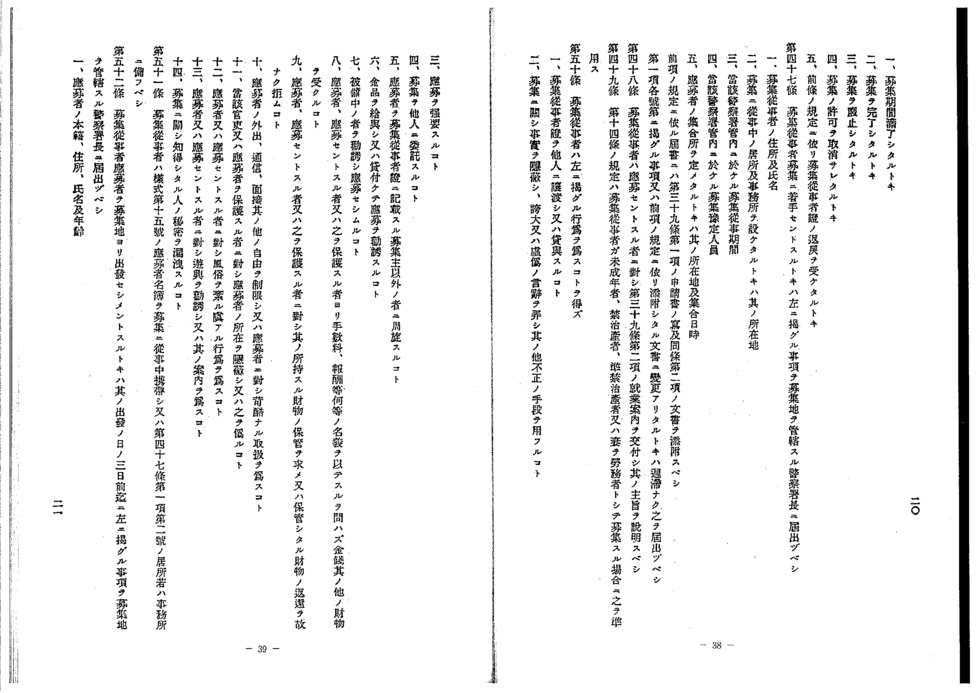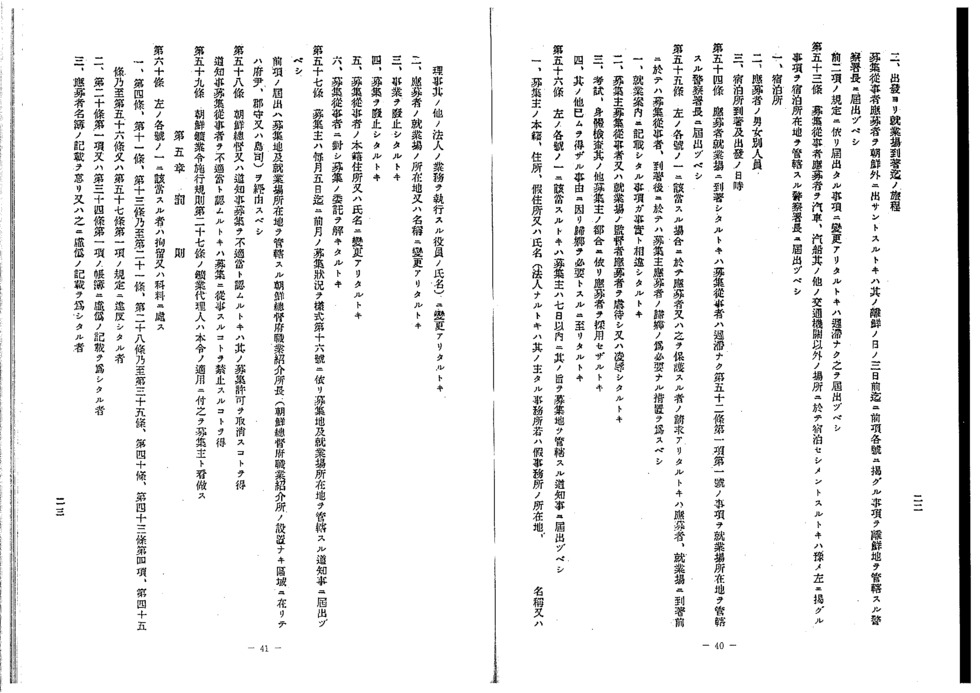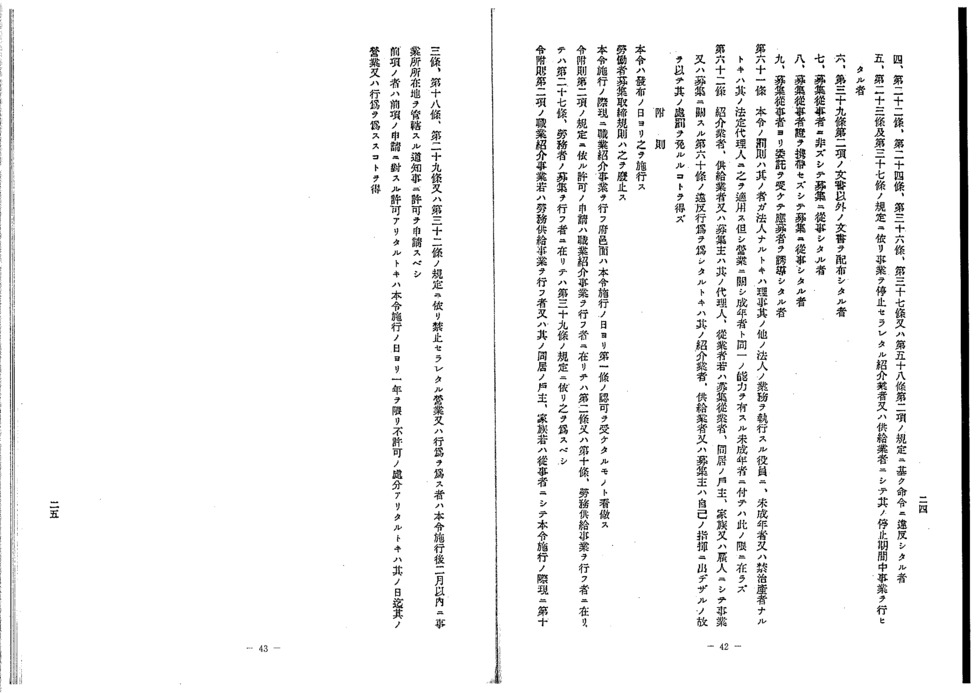Page 1
Page 1
Page 2
Page 3
Page 4
Page 5
Page 6
Page 7
Page 8
Page 9
Page 10
Official Gazette No. 3869, January 11, 1940
The Korea Employment Placement Ordinance shall be promulgated with the Imperial decision in accordance with Article 1 and Article 2 of Law No. 30 issued in 1911.
Jiro Minami, Governor-General of Korea
January 11, 1940
Order No. 2
Korea Employment Placement Ordinance
Article 1
In order to promote the appropriate allocation of work, the government shall manage employment placement services in accordance with this Ordinance.
Article 2
Together with employment placement services, the government shall administer employment instructions, employment guidance if necessary, and other matters related to employment placement.
The employment placement and employment instructions stipulated in the previous clause shall be conducted free of charge.
Article 3
Cities, towns and townships may provide employment placement services in accordance with the stipulations of the Governor-General of Korea.
Article 4 Parties other than cities, towns or townships who intend to provide employment placement services must receive permission from the governor of the province concerned in accordance with the stipulations of the Governor-General of Korea.
Article 5
Persons stipulated by the Governor-General of Korea to conduct the provision of labor supply services or the recruitment of workers for employment must receive the permission of the Governor-General of Korea or the governor of the province concerned in accordance with the stipulations of the Governor-General of Korea.
Matters considered necessary for the provision of labor supply services or recruitment of workers for employment stated in the previous clause shall be stipulated by the Governor-General of Korea.
Article 6
In the event that the governor of the province concerned considers it necessary for the supervision of employment placement services, in accordance with the stipulations of the Governor-General of Korea, a report concerning the services shall be required or the government official concerned may inspect the place where such services are conducted and survey the situation of the work, account books and other documents or other articles, in which case the government official concerned shall carry a certificate of identity.
Article 7
Persons to whom any of the following items is applicable shall receive six months’ imprisonment or a maximum fine of 500 yen.
- Persons who conduct employment placement services for a fee or a profit without receiving permission in accordance with the stipulations of Article 4 above.
- Persons who conduct labor supply services for a fee or a profit without receiving permission in accordance with the stipulations of Article 5 above.
Article 8
Persons who conduct recruitment of workers without receiving permission in accordance with Article 5 above shall receive a maximum fine of 100 yen or shall be taken into custody.
Article 9
In the event that a corporation or a representative, employee or other agent commits a violation as stipulated in the previous article in relation to the work of the corporation or person, the corporation or person concerned shall not be exempt from the stipulated penalty on grounds that the violation is not caused by their instructions.
Article 10
In the event that the party subject to penalty under this Ordinance is a corporation, it shall be applied to a director or other executive in charge of the corporation’s business, or in the event that the party is a minor or a person adjudged incompetent, it shall be applied to that person’s legal representative. However, this shall not apply with regard to minors who possess the same business abilities as an adult.
Article 11
In the circumstances of Articles 9 and 10 above, the penalty shall not be imprisonment or being taken into custody.
Article 12
This Ordinance shall not apply to employment placement of ship crews.
Necessary matters relating to employment placement of ship crews shall be stipulated by the Governor-General of Korea.
Additional Clause
The deadline for enforcing this Ordinance shall be stipulated by the Governor-General of Korea.
When this Ordinance comes into force, persons conducting employment placement services for which permission should be received as stipulated in Article 4 above and persons conducting labor supply services or the recruitment of workers for employment for which permission should be received as stipulated in Article 5 above shall, in accordance with the stipulations of the Governor-General of Korea, apply for permission either to the Governor-General of Korea or the governor of the province concerned within two months after the enforcement of this Ordinance.
The above-mentioned persons may conduct the said services or recruitment until the disposition of the above-mentioned permission or non-permission in response to application.
*The enforcement of the Korea Employment Placement Ordinance is posted in the Official Gazette special edition of January 20, 1940 (edition carrying the Korea Employment Placement Ordinance Enforcement Regulations).
Ordinance No. 6 of the Office of the Governor-General of Korea
The Korea Employment Placement Ordinance shall come into force on January 20, 1940.
Jiro Minami, Governor-General of Korea
January 20, 1940
Official Gazette special edition, January 20, 1940
Ordinance No. 7 of the Office of the Governor-General of Korea
The Korea Employment Placement Ordinance Enforcement Regulations are stipulated as follows.
Jiro Minami, Governor-General of Korea
January 20, 1940
Korea Employment Placement Ordinance Enforcement Regulations
Chapter 1: Employment Placement Services for No Charge
Article 1
In the event that cities, towns and townships intend to provide employment placement services as stipulated in Article 3 of the Korea Employment Placement Ordinance (hereinafter referred to as “the Ordinance”), they shall receive authorization of the governor of the province concerned concerning the name, location, facilities, prescribed number of employees of the office and the business management regulations. The same shall apply in the event of any change to these details.
Employment placement services conducted by cities, towns and townships shall be provided free of charge.
Article 2
When parties other than cities, towns or townships wish to obtain permission to conduct employment placement services for no charge in accordance with Article 4 of the Ordinance, they shall submit a written application indicating the following matters to the governor of the province with jurisdiction over the location of the business office.
- Legal domicile, address, name, age and personal history (in the case of a corporation, address of main business office, corporation name, articles of incorporation, and names, addresses and personal histories of directors and other executives conducting the corporation’s business)
- Location of office and its name
- Facilities
- Prescribed number of employees
- Business management regulations
Article 3
In the event that parties receiving permission as stipulated in the previous article intend to make any change to the articles of incorporation of the corporation, directors and other executives conducting the corporation’s business among the matters in item 1) of the previous article or to items 2) through 5) of the previous article, they shall receive permission as stipulated in the previous article.
Article 4
Cities, towns and townships conducting employment placement services (hereinafter referred to as “cities, towns and townships”) or parties conducting employment placement services for no charge other than cities, towns and townships (hereinafter referred to as “managers”) may not, under whatever name, receive commission or other property or profit as compensation.
Article 5
In the event that cities, towns and townships establish an office they shall promptly publicly notify its name, location and date of opening, and this shall also apply if they abolish the said office or make any change to the matters notified.
In the event that cities, towns and townships make a notification as stipulated in the previous clause, they shall report it to the governor of the province concerned.
Article 6
In the event that managers establish an office they shall immediately publicly announce its name, location and date of opening by an appropriate means, and this shall also apply if they abolish the said office or make any change to the matters announced.
In the event that managers make a public announcement in accordance with the stipulations of the previous clause or make any change to their addresses or names (in the case of a corporation, the location of the main business office, corporation name, and addresses or names of directors or other executives conducting the corporation’s business), they shall notify it to the governor of the province with jurisdiction over the location of the business office within seven days.
Should a manager die, the manager’s successor or the head of the manager’s household, or in the event of the dissolution of a corporation serving as a manager, the corporation’s liquidator, shall make the notification in accordance with the stipulations of the previous clause.
Article 7
Cities, towns and townships and managers shall prepare the following forms and records, and fill in the matters relating to placement without delay.
- Job posting form (Form No. 1)
- Job application form (Form No. 2)
- Employment placement daily register (Form No. 3)
The above-mentioned forms and records shall be stored for three years from the date on which the final entry is made.
Article 8
Cities, towns and townships and managers shall by the fifth day of every month notify the chief of the employment placement office of the Office of the Governor-General of Korea (or the governor of the city, county or island concerned in regions where there is no employment placement office of the Office of the Governor-General of Korea) of the business situation in the previous month using Form No. 4.
Article 9
In the event that the governor of the province concerned recognizes that a manager has violated the Ordinance, has harmed the public good or it is feared that it might harm the public good, the said governor may cancel permission or shall order that the whole or part of the business be suspended.
Chapter 2: Employment Placement Services for Profit
Article 10
In the event that parties other than cities, towns or townships wish to receive permission to conduct employment placement services for a fee or for profit as stipulated in Article 4 of the Ordinance, they shall submit an application indicating the following matters to the governor of the province with jurisdiction over the location of the office.
- Legal domicile, address, name, age and personal history (in the event of a corporation, location of main business office, corporation name, articles of incorporation, names, addresses and personal histories of directors and other executives conducting the corporation’s business)
- Location of office and its name
- Facilities
- Main type of work for which they conduct placement
- Amount of commission and method of receipt.
The above-mentioned application shall be submitted by way of the chief of the police station with jurisdiction over the location of the office.
When the governor of the province receives the application stipulated in the first clause, he shall thoroughly consult the opinion of the chief of the employment placement office of the Office of the Governor-General of Korea with jurisdiction over the location of the office (or the governor of the city, county or island concerned in regions where there is no employment placement office of the Office of the Governor-General of Korea).
Article 11
In the event that parties receiving permission as stipulated in the first clause of the previous article intend to make any change to the articles of incorporation of the corporation, directors and other executives conducting the corporation’s business among the matters in item 1) of the first clause of the previous article or to items 2) through 5) of the first clause of the previous article, they shall receive permission as stipulated in the first and second clauses of the previous article.
The stipulations of the third clause of the previous article shall apply mutatis mutandis in the circumstances described in the previous clause.
Article 12
Persons who take over, through inheritance, facilities for employment placement services provided for a charge or for profit may conduct the business upon receiving permission from the governor of the province concerned.
In the event that persons stipulated in the previous clause intend to receive authorization in accordance with the previous clause, they shall submit to the governor of the province with jurisdiction over the location of the office an application indicating the items stipulated in the first clause of the previous article and the following matters, attaching an extract of their family register, within one month of the date of commencement of inheritance.
- Name of legator
- Relationship with legator and reason for commencement of inheritance
Persons stipulated in the previous clause may conduct business until the disposition of the above-mentioned permission or non-permission in response to an application in accordance with the stipulations of the previous clause.
The stipulations of the second and third clauses of Article 10 above shall apply mutatis mutandis in the circumstances described in the first clause.
Article 13
Persons conducting employment placement services for a charge or for profit (hereinafter referred to as “placement business operators”) and heads of household and family members residing at the same address may not operate guest houses, restaurants, rental spaces, geisha houses, gaming houses, geishas/licensed prostitutes/barmaids or as brokers for similar businesses, matchmaking services, credit reporting agencies, labor supply services, pawn shops, antique dealers, loan businesses or other similar businesses as well as becoming employees of such businesses or engaging in recruiting workers, nor may they become an administrative scrivener or an assistant to an administrative scrivener, in accordance with the Korea Administrative Scrivener Control Regulations.
The stipulations of the previous clause shall apply mutatis mutandis to directors or other executives conducting the business of a corporation if the placement business is a corporation, and legal representatives if the person conducting the placement business is a minor. However, this shall not apply to minors who possess the same business abilities as an adult.
Article 14
Placement business operators may not engage in the employment placement of minors, incompetent persons, quasi-incompetent persons, and wives without the permission of their legal representative, guardian, curator, or husband, respectively. However, this shall not apply if it is impossible to receive such permission for unavoidable reasons, but possible to receive the permission of a person serving as a guardian.
Article 15
Apart from the commission for which they have received permission, placement business operators may not, under whatever name, receive property or profits as compensation.
Article 16
Placement business operators may not take any of the following actions.
- Post any exaggerated or mendacious advertisement or bulletin regarding their business.
- Conceal any facts, use any exaggerated or mendacious rhetoric, or use any improper means concerning placement.
- Make placements against the wishes of job applicants.
- Provide seekers of work with accommodation.
- Entice people into taking work by giving or lending them money or goods.
- Solicit or otherwise provide placement for persons who are already
- Solicit persons already working at a place other than the business office.
- Provide persons enticing applicants with property or other profit, under whatever name.
- Take part in any exchange of property regarding placement between persons engaged in employment.
- Seek to store the property of seekers of work or refuse without reason to return such stored property.
- Entice seekers of work to sell or pawn their property.
- Purchase the property of seekers of work and gain improper profit thereby.
- Serve as an agent for geishas, licensed prostitutes, or barmaids or those engaged in similar activities.
- Engage in any behavior towards seekers of work that offends public decency.
- Invite seekers of work to indulge in merrymaking or take them to such an establishment.
- Divulge people’s secrets learned through employment placement.
Article 17
In the event that placement business operators employ an agent, they shall notify the chief of the police station with jurisdiction over the location of the business office the legal domicile, address, name, age and personal history of the agent within five days from the date of commencement of employment.
Article 18
The first clause of Article 13 and items 9) through 16) of Article 16 above shall apply mutatis mutandis to agents undertaking placement.
Article 19
In the event that any of the following items apply, placement business operators shall notify the chief of the police station with jurisdiction over the location of the office within seven days.
- When there is a change in the legal domicile, address, name of a placement business operator (in the case of a corporation, address of main business office, corporation name, names and addresses of directors and other executives conducting the corporation’s business), or name of business.
- When the placement business operator discontinues the business.
- When the employment of an agent is discontinued.
- When there is a change in an agent’s name or address.
- When an agent dies.
Should a placement business operator die, the operator’s successor or the head of the operator’s household, or in the event of the dissolution of a corporation engaged in employment placement, the corporation’s liquidator shall make the notification in accordance with the stipulations of the previous clause.
Article 20
Placement business operators shall prepare the following registers and record in them the matters relating to placement without delay.
- Job posting register (Form No. 5)
- Job application register (Form No. 6)
- Employment placement daily register (Form No. 7)
- Commission receipt register (Form No. 8)
The above-mentioned registers shall be stored for three years from the date on which the final entry is made.
Article 21
Placement business operators shall by the fifth day of every month notify the chief of the employment placement office of the Office of the Governor-General of Korea (or the governor of the city, county or island concerned in regions where there is no employment placement office of the Office of the Governor-General of Korea) of the business situation in the previous month using Form No. 9.
Article 22
In the event that the governor of the province concerned considers it necessary, he may order changes in the amount of commission or the method of receiving it.
Article 23
In the event that any of the following items apply, the governor of the province concerned may order the cancellation of permission or suspension of business.
- When placement business operators commit a violation of the Ordinance or any measures based on the Ordinance.
- When placement business operators do not conduct their business for six months or more for no normal reason.
- Apart from 1) and 2) above, when it is recognized that placement business operators are not deemed to be suitable to conduct their placement business.
Article 24
In the event that the chief of the police station concerned recognizes that agents are not suitable to conduct the placement business, he may prohibit their use by the placement business operators.
Article 25
The Ordinance does not apply to employment placement for geishas, licensed prostitutes, or barmaids or those engaged in similar activities.
Necessary matters regarding employment placement in the previous clause shall be stipulated separately.
Chapter 3: Labor supply businesses
Article 26
Labor supply businesses that receive permission in accordance with the stipulations of the first clause of Article 5 of the Ordinance shall be businesses that at normal times provide thirty or more temporarily employed workers for a charge or for profit.
Article 27
Parties wishing to receive permission as labor supply businesses shall submit a written application indicating the following matters to the governor of the province with jurisdiction over the location of their business office.
- Legal domicile, address, name, age and personal history (in the case of a corporation, location of main business office, corporation name, articles of incorporation, and names, addresses and personal histories of directors and other executives conducting the corporation’s business)
- Location of office and its name
- Main region where workers are obtained
- Type of work done by registered workers
- Method of gaining profit by providing workers, and amount or rate
- Method of dividing profit when providing workers who were obtained through another party
- Method of paying registered workers
- Assistance or other measures in the event of injury, illness, death, etc. of registered workers in the course of work
- Method of lending money or goods to registered workers and method of their return
- In the event that accommodation facilities are provided for registered workers, their location, structure (by attaching a floor plan), capacity, and accommodation charge
- Nature of welfare facilities if they are provided for registered workers
The stipulations of the second and third clauses of Article 10 above shall apply mutatis mutandis in the circumstances described in the previous clause.
Article 28
In the event that parties receiving permission as stipulated in the first clause of the previous article intend to make any change to the articles of incorporation of the corporation, directors and other executives conducting the corporation’s business among the matters in item 1) of the first clause of the previous article or to items 2) through 11) of the first clause of the previous article, they shall receive permission as stipulated in the first clause of the previous article.
The stipulations of the second and third clauses of Article 10 above shall apply mutatis mutandis in the circumstances of the previous clause.
Article 29
The stipulations of Article 13 above shall apply mutatis mutandis to parties providing labor supply services (hereinafter referred to as “supply business operators”) and heads of household and family members residing at the same address. However, this shall not apply to parties engaged in the recruitment of workers.
Article 30
The stipulations of Article 14 above shall apply mutatis mutandis in the event that supply business operators make minors, incompetent persons, quasi-incompetent persons or wives their registered workers.
Article 31
Supply business operators may not take any of the following actions.
- Post any exaggerated or mendacious advertisement or bulletin regarding their business.
- Engage in providing workers to employers against the wishes of registered workers.
- Solicit registered workers by giving or lending them money or goods.
- Solicit persons who are already working and make them registered workers.
- Seek to store the possessions of registered workers or refuse to return stored property without reason
- Entice registered workers to sell or pawn their property.
- Purchase the property of registered workers and gain improper profit thereby.
- Engage in any behavior towards registered workers that offends public decency.
- Invite registered workers to engage in merrymaking or take them to such an establishment.
- Restrict the going out, communication, interviews and other freedoms of registered workers or give harsh treatment to registered workers.
- Conceal or distort the whereabouts of registered workers from the government officials concerned or their guardians.
- Provide accommodation beyond the stipulated capacity at accommodation facilities for registered workers.
- Provide accommodation, without reason, for persons who are not registered workers at facilities for registered workers.
Article 32
In the event that supply business operators employ an agent, they shall notify the chief of the police station with jurisdiction over the location of the business office the legal domicile, address, name, age and personal history of the agent within five days from the date of commencement of employment.
The first clause of Article 13 and items 5) through 9) of the previous article above shall apply mutatis mutandis to agents undertaking supply services. However, this shall not apply to persons engaged in the recruitment of workers.
Article 33
The stipulations of Article 19 above shall apply mutatis mutandis to supply business operators and their agents.
Article 34
Supply business operators shall prepare the following registers in their business offices and record in them the matters relating to supply without delay.
- Registered workers register (Form No. 10)
- Worker supply register (Form No. 11)
- Wages receipt and payment register (Form No. 12)
The above-mentioned registers shall be stored for three years from the date on which the final entry is made.
Article 35
Supply business operators shall by the fifth day of every month notify the chief of the employment placement office of the Office of the Governor-General of Korea (or the governor of the city, county or island concerned in regions where there is no employment placement office of the Office of the Governor-General of Korea) of the business situation in the previous month using Form No. 13.
Article 36
In the event that the governor of the province concerned considers it necessary, he may order changes in the matters stipulated in items 5) through 11) of Article 27 above.
Article 37
The stipulations of Article 23 and Article 24 above shall apply mutatis mutandis to supply business operators.
Chapter 4: Recruitment of Workers
Article 38
The recruitment of workers for which permission must be received according to the stipulations of the first clause of Article 5 of the Ordinance shall be the recruitment of factory workers, miners, fishermen and construction and other workers engaging in heavy labor, , except in circumstances corresponding to any of the following items.
- When it is necessary to change the residence for the employment of an applicant.
- When recruitment is carried out in accordance with the Migrant Protection Law.
Article 39
Parties wishing to receive permission to conduct recruitment of workers shall submit a written application indicating the following matters to the governor of the province with jurisdiction over the location of their business office. However, if the region of recruitment covers two or more provinces, they shall submit the application to the Governor-General of Korea.
- Legal domicile, address, occupation, name, and age (in the case of a corporation, location of main business office, corporation name, type of business, and names of executives conducting the corporation’s business). In the case of a person who does not have an address in Korea, he shall establish a temporary address within the province to which the place of recruitment belongs and in the case of a corporation which does not have a main office in Korea, it shall establish a location of a temporary office within the province to which the place of recruitment belongs, and in both cases the address/location shall be included in the application.
- Name and location of workplace of applicants
- Type of work to be undertaken by applicants
- Number of persons to be recruited (by gender, marital status, and work)
- Range of ages of workers to be recruited
- Region of recruitment
- Period of recruitment
- Means of transporting the applicants
- Legal domicile, address, name, age, occupation and personal history of recruiting agent (including recruiters who themselves engage in recruiting; the same shall apply hereafter)
- Region of recruitment of each recruiting agent and expected numbers of persons to be recruited
- Remuneration to be provided to recruiting agents
Employment details indicating the matters listed below and other documents to be distributed concerning recruitment, together with two photographs of the recruiting agent, shall be attached to the application stipulated in the previous clause.
- Matters stated in items 1) through 3) of the previous clause.
- In cases of short-term projects, dates of commencement and termination of project
- Matters related to working hours, rest hours, days off and nighttime work
- Matters related to wages
- Matters related to bearing of expenses of accommodation, meals and other everyday expenses
- Matters related to savings and work incentives
- Welfare facilities and methods of guidance
- Matters related to bearing of round-trip travel expenses (including round-trip transportation expenses of parents, siblings or other persons affected by a worker’s injury, illness or death)
- Matters related to imposition of penalties
- Matters related to period of employment and dismissal
- Matters related to aid or relief in the event of injury, illness or death
The documents to be submitted to the Governor-General of Korea in accordance with the proviso of the first clause above shall be handed directly to the Governor-General of Korea, notwithstanding the stipulations of Ordinance No. 5 of the Office of the Governor-General of Korea of 1910.
Article 40
In the event that recruiters intend to make any change to items 3) through 8), item 10) or item 11) of the second clause of the previous article they shall prepare the matters to be changed, and in the event that they intend to change the recruiting agent they shall prepare the matters indicated in item 9) and item 10) of the first clause of the previous article regarding the person to be newly appointed as the recruiting agent, attaching two photographs of that person, and in both cases receive the permission of the governor of the province with jurisdiction over the place of recruitment.
In the event of any change to the documents stipulated in the second clause of the previous article, the change shall be notified without delay to the governor of the province with jurisdiction over the place of recruitment.
Article 41
The written application and documents according to the stipulations of Article 39 and Article 40 above shall be submitted by way of the governor of the province with jurisdiction over the location of the place of employment of the applicants.
Article 42
When the Governor-General of Korea grants permission for the recruitment of workers, a copy of the application shall be sent to the governor of the province with jurisdiction over the place of recruitment.
Article 43
When the governor of the province concerned grants permission for the recruitment of workers or receives a copy of the application stipulated in the previous article, a recruiting agent certificate (Form No. 14) shall be prepared for each recruiting agent and issued to the recruiter.
When a recruiter has a recruiting agent engage in recruiting, he shall issue a recruiting agent certificate to the agent.
In the event that a recruiting agent certificate is lost or damaged, the recruiter and the recruiting agent may apply for its reissue.
In the event of any change to the matters indicated on a recruiting agent certificate, the recruiter or the recruiting agent shall without delay submit the recruiting agent certificate and apply for its renewal.
Two photographs of the recruiting agent shall be attached to the applications stipulated in the previous two clauses.
Article 44
When recruiting agents carry out recruitment, they shall carry their recruiting agent certificate with them and applicants or persons intending to apply, or their guardians, may request the recruiting agents to show the recruiting agent certificate.
Article 45
In the event that any of the following items is applicable, recruiting agents shall return the recruiting agent certificate to the recruiter without delay.
- When engagement in recruitment is discontinued.
- When requested to do so by the recruiter.
- When prohibited from engaging in recruiting in accordance with the stipulations of the second clause of Article 58 below.
In the event of the death of a recruiting agent, the person with the duty of giving notice according to Article 117 of the Family Registration Law or Article 99 of the Korea Family Registration Ordinance shall return the recruiting agent certificate to the recruiter without delay.
Article 46
In the event that any of the following items is applicable, the recruiter shall without delay return the recruiting agent certificate to the governor of the province from whom it was received.
- When the period of recruitment ends.
- When recruitment is completed.
- When recruitment is discontinued.
- When permission for recruitment is canceled.
- When the recruiting agent certificate is returned in accordance with the stipulations of the previous article.
Article 47
In the event that a recruiting agent intends to start recruitment, it shall notify the chief of the police station with jurisdiction over the place of recruitment of the following matters.
- Name and address of recruiting agent
- Place of residence during engagement in recruitment, or if an office is established, location of office
- Period of engagement in recruitment in the place under the jurisdiction of police station concerned
- Number of persons to be recruited in the place under the jurisdiction of police station concerned
- If a meeting place for applicants is determined, its location and date and time of gathering
A copy of the application stipulated in the first clause of Article 39 and the documents stipulated in the second clause thereof shall be attached to the notification stated in the previous clause.
In the event of any change in the matters stated in the items of the first clause or in the documents attached in accordance with the stipulations of the previous clause, notification shall be made without delay.
Article 48
Recruiting agents shall give the employment details stated in the second clause of Article 39 to persons intending to apply and explain the main points to them.
Article 49
The stipulations of Article 14 above shall apply mutatis mutandis in the event that recruiting agents recruit minors, incompetent persons, quasi-incompetent persons, and wives as workers.
Article 50
Recruiting agents may not take any of the following actions
- Hand over or lend recruiting agent certificates to other persons.
- Conceal, or use exaggeration or mendacious rhetoric about matters relating to recruitment or use improper means for recruitment.
- Coerce persons to apply.
- Entrust others to conduct recruitment.
- Recommend the applicants to any person other than the recruiter written on the recruiting agent certificate.
- Solicit application by giving money or goods, or by providing loans.
- Solicit application from persons already in work.
- Receive money or other property as commission, remuneration or under whatever other name from applicants or persons intending to apply, or their guardians.
- Seek to store the property of applicants or persons intending to apply, or their guardians, or refuse without reason to return such stored property.
- Restrict the going out, communication, interviews and other freedoms of applicants or give harsh treatment to applicants.
- Conceal or distort the whereabouts of applicants from the government officials concerned or the applicants’ guardians.
- Engage in any behavior towards applicants or persons intending to apply that offends public decency.
- Invite applicants or persons intending to apply to indulge in merrymaking or take them to such an establishment.
- Divulge personal secrets learned in relation to application.
Article 51
Recruiting agents shall carry a register of applicants (Form No. 15) when they are recruiting or shall display it at a place of residence or office as stipulated in item 2) of the first clause of Article 47.
Article 52
In the event that recruiting agents intend to have applicants depart from the place of recruitment, they shall notify the chief of the police station with jurisdiction over the place of recruitment of the following matters by three days before the date of departure.
- Legal domiciles, addresses, and names of applicants
- Itinerary from departure to place of employment
In the event that recruiting agents intend to have applicants leave Korea, they shall notify the chief of the police station with jurisdiction over the place of departure from Korea of the above matters by three days before the date of departure from Korea.
In the event of any change in the matters notified according to the stipulations of the previous two clauses, notification shall be made without delay.
Article 53
In the event that recruiting agents intend to have applicants stay overnight at a place other than a train, steamship or other means of transport, they shall notify the chief of the police station with jurisdiction over the place of accommodation of the following matters in advance.
- Place of accommodation
- Number of applicants by gender
- Time of arrival at place of accommodation and time of departure
Article 54
When applicants arrive at the place of employment, recruiting agents shall notify the chief of the police station with jurisdiction over the place of employment of the matters stipulated in item 1) of the first clause of Article 52 without delay.
Article 55
When any of the following items is applicable and applicants or their guardians so request, the necessary measures shall be taken for the return of applicants by recruiting agents engaged in cases prior to arrival at the place of employment and by recruiters in cases after arrival at the place of employment.
- When a matter indicated in the employment details differs from the truth.
- When recruiters, recruiting agents or supervisors of the place of employment mistreat or abuse applicants.
- When the applicants are not employed due to testing, physical examination or other circumstances of the recruiter.
- When it becomes necessary for the applicants to return for other unavoidable reasons.
Article 56
In the event that any of the following items is applicable, the recruiter shall notify the governor of the province with jurisdiction over the place of recruitment of it within seven days.
- When there is a change in legal domicile, address, temporary address and name of the recruiter (in the case of a corporation, location of main business office or temporary business office, corporation name, and names of directors and other executives conducting the corporation’s business).
- When there is a change in the location or name of the place of employment of applicants.
- When work is discontinued.
- When recruitment is discontinued.
- When there is a change in legal domicile, address or name of the recruiting agent.
- When entrustment of recruitment by the recruiting agent is discontinued.
Article 57
Recruiters shall notify by the fifth day of every month the governor of the province with jurisdiction over the place of recruitment and place of employment of the recruitment situation in the previous month using Form No. 16.
The notification stated in the previous clause shall be submitted by way of the chief of the employment placement office of the Office of the Governor-General of Korea with jurisdiction over the place of recruitment and place of employment (or the governor of the city, county or island concerned in regions where there is no employment placement office of the Office of the Governor-General of Korea).
Article 58
When the Governor-General of Korea or the governor of the province concerned considers recruitment to be inappropriate, he may cancel permission for recruitment.
When the governor of the province concerned considers a recruiting agent to be inappropriate, he may prohibit the agent from engaging in recruiting.
Article 59
Mining agents stipulated in Article 27 of the Korea Mining Ordinance Enforcement Regulations shall be considered to be recruiters for the purpose of applying the Ordinance.
Chapter 5: Penalties
Article 60
Persons to whom any of the following items is applicable shall be taken into custody or subjected to a fine.
- Persons who violate the stipulations of Article 4, Article 11, Articles 13 through 21, Articles 28 through 35, Article 40, fourth clause of Article 43, Articles 45 through 56, or the first clause of Article 57
- Persons who record false information in registers stipulated in the first clause of Article 20 or the first clause of Article 34
- Persons who fail to record information or record false information in the register of applicants
- Persons who violate orders based on the stipulations of Article 22, Article 24, Article 36 or the second clause of Article 58
- Placement business or supply business operators who conduct their business during the period of suspension when their business has been suspended in accordance with the stipulations of Article 23 and Article 37
- Persons who distribute documents apart from the documents stated in the second clause of Article 39
- Persons who engage in recruiting without being recruiting agents.
- Persons who engage in recruiting without carrying a recruiting agent certificate
- Persons who solicit applicants under commission from recruiting agents.
Article 61
Penalties regarding the Ordinance shall be applied to directors or other executives conducting the corporation’s business with the party concerned is a corporation and to legal representatives when the party concerned is a minor or incompetent person. However, this shall not apply with regard to minors who possess the same business abilities as an adult.
Article 62
With regard to placement business operators, supply business operators or recruiters, in the event that their representatives, agents, recruiting agents, heads of household or family members residing at the same address, or employees commit any violation stipulated in Article 60 regarding the business or recruitment, the placement business operator, supply business operator or recruiter concerned shall not be exempt from the stipulated penalty on grounds that the violation was not caused by their instructions.
